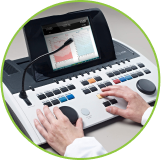
How do I know if I need a hearing aid?
Jei pastebite, kad kartais tenka prašyti pakartoti, garsinti televizorių ar sunku girdėti pokalbius – tai ženklas, kad vertėtų pasitikrinti klausą. Paprastas klausos tyrimas suteiks aiškumo ir padės žengti pirmą žingsnį.
Does a hearing aid help you hear better?
Taip. Daugeliui žmonių aparatai padeda aiškiau girdėti pokalbius, aplinkos garsus, vėl jaustis aktyvia kasdienybėje. Tinkamai pritaikytas aparatas gali gerokai pagerinti gyvenimo kokybę.
Can hearing aids fully restore hearing?
Klausos aparatai pagerina girdėjimą, tačiau jie neatkuria klausos visiškai taip, kaip girdėjote anksčiau. Jie padeda geriau suprasti kalbą, dalyvauti pokalbiuose ir jaustis užtikrinčiau kasdienybėje. Tai tarsi akiniai – jie pagerina regėjimą, bet neišgydo trumparegystės.
Are there hearing aids that are completely invisible?
Yes, there are very small, barely noticeable models that can be worn discreetly. The choice depends on your needs and hearing condition – we help you find the right one.
Does it take a while to get used to a hearing aid?
Kai kuriems žmonėms – taip, kitiems prireikia kelių dienų ar savaičių. Tai visiškai natūralu. Mes padedame visame kelyje: nuo pirmo pasimatavimo iki pilno prisitaikymo.
Can I try a hearing aid before purchasing it?
Taip, siūlome bandomąjį laikotarpį, kad galėtumėte patogiai įvertinti, ar aparatas jums tinka. Tai leidžia priimti sprendimą be streso.
Are hearing aids reimbursed by the state?
Taip, daugeliu atvejų klausos aparatai gali būti dalinai ar pilnai kompensuojami. Mūsų specialistai padeda išsiaiškinti visas galimybes ir sutvarkyti dokumentus.
How much do hearing aids cost?
Kainos labai įvairios – nuo paprastų iki pažangių, su išmaniosiomis funkcijomis. Visuomet padedame rasti geriausią variantą pagal jūsų poreikius ir galimybes.
Are hearing aids suitable for people of all ages?
Taip, jie tinka tiek vaikams, tiek suaugusiesiems. Aparatai parenkami individualiai, atsižvelgiant į klausos lygį, gyvenimo būdą ir pageidavimus.
How long do hearing aids last?
Vidutiniškai – 5–6 metus. Su tinkama priežiūra jie gali tarnauti ir ilgiau. Be to, technologijos nuolat tobulėja, tad po kelių metų gali būti noras pereiti prie naujesnio sprendimo.
Can hearing aids be connected to a telephone or television?
Taip! Dauguma šiuolaikinių aparatų jungiasi „Bluetooth“ ryšiu prie įvairių įrenginių – tai leidžia mėgautis muzika, pokalbiais ar filmais dar patogiau.

Didn't find the answer? Write your question here
Important
We will contact you at the phone number provided within 24 hours of your request. If your request is submitted on a weekend or holiday, we will contact you on the next business day.


